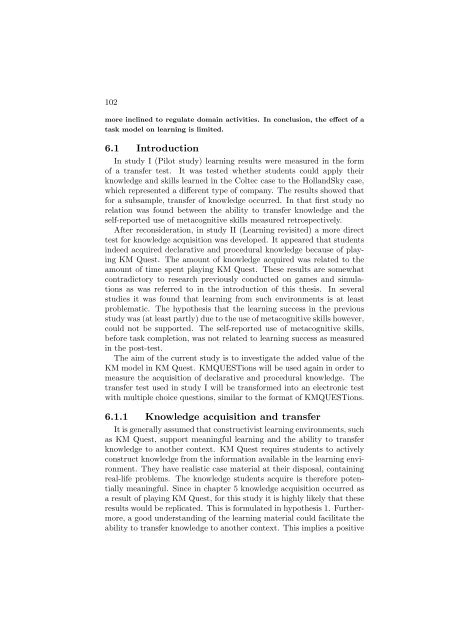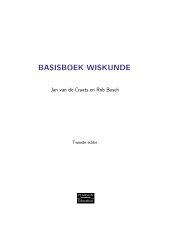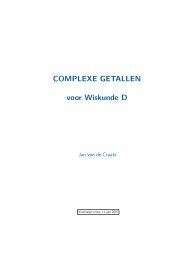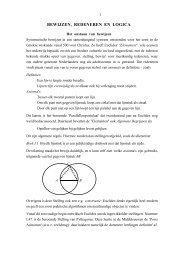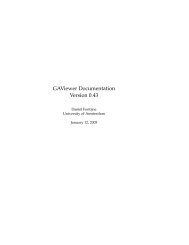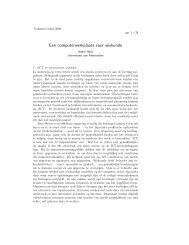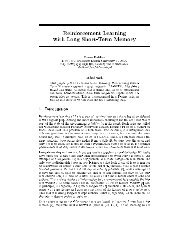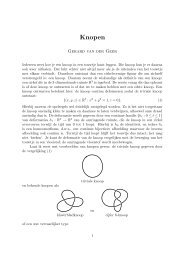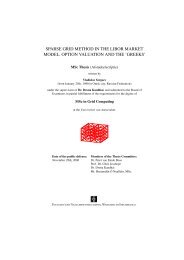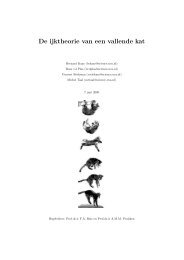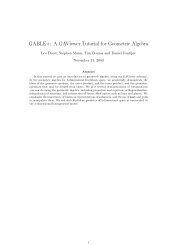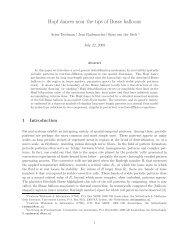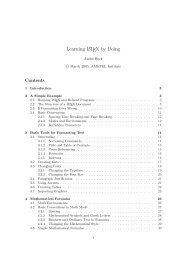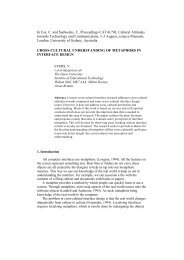The role of metacognitive skills in learning to solve problems
The role of metacognitive skills in learning to solve problems
The role of metacognitive skills in learning to solve problems
Create successful ePaper yourself
Turn your PDF publications into a flip-book with our unique Google optimized e-Paper software.
102<br />
more <strong>in</strong>cl<strong>in</strong>ed <strong>to</strong> regulate doma<strong>in</strong> activities. In conclusion, the effect <strong>of</strong> a<br />
task model on learn<strong>in</strong>g is limited.<br />
6.1 Introduction<br />
In study I (Pilot study) learn<strong>in</strong>g results were measured <strong>in</strong> the form<br />
<strong>of</strong> a transfer test. It was tested whether students could apply their<br />
knowledge and <strong>skills</strong> learned <strong>in</strong> the Coltec case <strong>to</strong> the HollandSky case,<br />
which represented a different type <strong>of</strong> company. <strong>The</strong> results showed that<br />
for a subsample, transfer <strong>of</strong> knowledge occurred. In that first study no<br />
relation was found between the ability <strong>to</strong> transfer knowledge and the<br />
self-reported use <strong>of</strong> <strong>metacognitive</strong> <strong>skills</strong> measured retrospectively.<br />
After reconsideration, <strong>in</strong> study II (Learn<strong>in</strong>g revisited) a more direct<br />
test for knowledge acquisition was developed. It appeared that students<br />
<strong>in</strong>deed acquired declarative and procedural knowledge because <strong>of</strong> play<strong>in</strong>g<br />
KM Quest. <strong>The</strong> amount <strong>of</strong> knowledge acquired was related <strong>to</strong> the<br />
amount <strong>of</strong> time spent play<strong>in</strong>g KM Quest. <strong>The</strong>se results are somewhat<br />
contradic<strong>to</strong>ry <strong>to</strong> research previously conducted on games and simulations<br />
as was referred <strong>to</strong> <strong>in</strong> the <strong>in</strong>troduction <strong>of</strong> this thesis. In several<br />
studies it was found that learn<strong>in</strong>g from such environments is at least<br />
problematic. <strong>The</strong> hypothesis that the learn<strong>in</strong>g success <strong>in</strong> the previous<br />
study was (at least partly) due <strong>to</strong> the use <strong>of</strong> <strong>metacognitive</strong> <strong>skills</strong> however,<br />
could not be supported. <strong>The</strong> self-reported use <strong>of</strong> <strong>metacognitive</strong> <strong>skills</strong>,<br />
before task completion, was not related <strong>to</strong> learn<strong>in</strong>g success as measured<br />
<strong>in</strong> the post-test.<br />
<strong>The</strong> aim <strong>of</strong> the current study is <strong>to</strong> <strong>in</strong>vestigate the added value <strong>of</strong> the<br />
KM model <strong>in</strong> KM Quest. KMQUESTions will be used aga<strong>in</strong> <strong>in</strong> order <strong>to</strong><br />
measure the acquisition <strong>of</strong> declarative and procedural knowledge. <strong>The</strong><br />
transfer test used <strong>in</strong> study I will be transformed <strong>in</strong><strong>to</strong> an electronic test<br />
with multiple choice questions, similar <strong>to</strong> the format <strong>of</strong> KMQUESTions.<br />
6.1.1 Knowledge acquisition and transfer<br />
It is generally assumed that constructivist learn<strong>in</strong>g environments, such<br />
as KM Quest, support mean<strong>in</strong>gful learn<strong>in</strong>g and the ability <strong>to</strong> transfer<br />
knowledge <strong>to</strong> another context. KM Quest requires students <strong>to</strong> actively<br />
construct knowledge from the <strong>in</strong>formation available <strong>in</strong> the learn<strong>in</strong>g environment.<br />
<strong>The</strong>y have realistic case material at their disposal, conta<strong>in</strong><strong>in</strong>g<br />
real-life <strong>problems</strong>. <strong>The</strong> knowledge students acquire is therefore potentially<br />
mean<strong>in</strong>gful. S<strong>in</strong>ce <strong>in</strong> chapter 5 knowledge acquisition occurred as<br />
a result <strong>of</strong> play<strong>in</strong>g KM Quest, for this study it is highly likely that these<br />
results would be replicated. This is formulated <strong>in</strong> hypothesis 1. Furthermore,<br />
a good understand<strong>in</strong>g <strong>of</strong> the learn<strong>in</strong>g material could facilitate the<br />
ability <strong>to</strong> transfer knowledge <strong>to</strong> another context. This implies a positive


